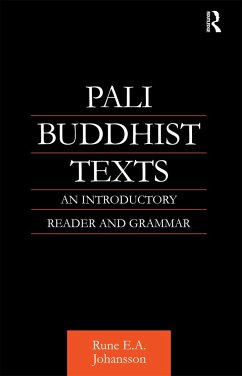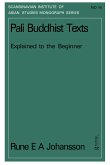- Broschiertes Buch
- Merkliste
- Auf die Merkliste
- Bewerten Bewerten
- Teilen
- Produkt teilen
- Produkterinnerung
- Produkterinnerung
Pali is one of the Middle Indian idioms and the classical language of Theravada Buddhism. It is therefore important both to linguists and students of Buddhism. This introductory book centres on a collection of original texts, each selected as an especially important and beautiful formulation of a Buddhist idea. By means of a vocabulary, translation and commentary, each text is explained so concretely that it can be read with little preparation. Detailed explanations are provided for the many technical terms, which have frustrated so many western explorers of Buddhism. For reference, a grammar…mehr
Andere Kunden interessierten sich auch für
![Texts from the Buddhist Canon Texts from the Buddhist Canon]() Samuel BealTexts from the Buddhist Canon42,99 €
Samuel BealTexts from the Buddhist Canon42,99 €![Pali Buddhism Texts Nims14 Pali Buddhism Texts Nims14]() Rune E A JohanssonPali Buddhism Texts Nims1449,99 €
Rune E A JohanssonPali Buddhism Texts Nims1449,99 €![Pali Buddhism Pali Buddhism]() Frank HoffmanPali Buddhism49,99 €
Frank HoffmanPali Buddhism49,99 €![Buddhist Thought and Applied Psychological Research Buddhist Thought and Applied Psychological Research]() Buddhist Thought and Applied Psychological Research75,99 €
Buddhist Thought and Applied Psychological Research75,99 €![Si-Yu-Ki Buddhist Records of the Western World Si-Yu-Ki Buddhist Records of the Western World]() Samuel BealSi-Yu-Ki Buddhist Records of the Western World63,99 €
Samuel BealSi-Yu-Ki Buddhist Records of the Western World63,99 €![Innovative Buddhist Women Innovative Buddhist Women]() Karma Lekshe TsomoInnovative Buddhist Women69,99 €
Karma Lekshe TsomoInnovative Buddhist Women69,99 €![Indian Buddhist Studies on Non-Buddhist Theories of a Self Indian Buddhist Studies on Non-Buddhist Theories of a Self]() James DuerlingerIndian Buddhist Studies on Non-Buddhist Theories of a Self59,99 €
James DuerlingerIndian Buddhist Studies on Non-Buddhist Theories of a Self59,99 €-
-
-
Pali is one of the Middle Indian idioms and the classical language of Theravada Buddhism. It is therefore important both to linguists and students of Buddhism. This introductory book centres on a collection of original texts, each selected as an especially important and beautiful formulation of a Buddhist idea. By means of a vocabulary, translation and commentary, each text is explained so concretely that it can be read with little preparation. Detailed explanations are provided for the many technical terms, which have frustrated so many western explorers of Buddhism. For reference, a grammar is provided. Sanskrit parallels to many of the words are given, as well as a special chapter comparing the two languages.
Hinweis: Dieser Artikel kann nur an eine deutsche Lieferadresse ausgeliefert werden.
Hinweis: Dieser Artikel kann nur an eine deutsche Lieferadresse ausgeliefert werden.
Produktdetails
- Produktdetails
- Verlag: Routledge
- Seitenzahl: 160
- Erscheinungstermin: 2. Juni 1998
- Englisch
- Abmessung: 234mm x 156mm x 9mm
- Gewicht: 254g
- ISBN-13: 9780700710683
- ISBN-10: 070071068X
- Artikelnr.: 22062501
- Herstellerkennzeichnung
- Libri GmbH
- Europaallee 1
- 36244 Bad Hersfeld
- gpsr@libri.de
- Verlag: Routledge
- Seitenzahl: 160
- Erscheinungstermin: 2. Juni 1998
- Englisch
- Abmessung: 234mm x 156mm x 9mm
- Gewicht: 254g
- ISBN-13: 9780700710683
- ISBN-10: 070071068X
- Artikelnr.: 22062501
- Herstellerkennzeichnung
- Libri GmbH
- Europaallee 1
- 36244 Bad Hersfeld
- gpsr@libri.de
Rune E.A. Johansson
Chapter 1 Experience is the only Criterion (Majjhima Nikaya I 265)
Chapter 2 Definition of Suffering (Digha Nikaya II 305)
Chapter 3 The Cause of Suffering (Digha Nikaya II 308)
Chapter 4 The Cessation of Suffering (Digha Nikaya II 310)
Chapter 5 The way to Freedom from Suffering (Digha Nikaya II 311)
Chapter 6 The Impermanence of Life (Samyutta Nikaya I 109)
Chapter 7 There is no Soul (Buddhaghosa, Visuddhimagga XVI 90)
Chapter 8 Definition of Personality (Samyutta Nikaya 1135)
Chapter 9 The Factors of Personality (Majjhima Nikaya I 435)
Chapter 10 Feeling (Majjhima Nikaya I 302 f)
Chapter 11 Perception and Ideation
Chapter 12 Three Types of Activity (Majjhima Nikaya I 301)
Chapter 13 Volition and the Activities (Samyutta Nikaya III 60)
Chapter 14 The Origin of Conscious Processes (Majjhima Nikaya I 259)
Chapter 15 Conciousness and Rebirth (Anguttara Nikaya I 223
Chapter 16 Consciousness may be Calmed (Sutta Nipata, verses 734, 735)
Chapter 17 The Psychological Law of Causality and Its Use
Chapter 18 Liberation is a Natural Process (Anguttara Nikaya V 2 f)
Chapter 19 The Origin and Control of Suffering (Samyutta Nikaya IV 86)
Chapter 20 Everything is Caused (Samyutta Nikaya I 134)
Chapter 21 Man Forms his Own Destiny (Dhammapada, verse 80)
Chapter 22 Karma Sometimes Works Slowly (Dhammapada, verse 71)
Chapter 23 How Rebirth is Influenced by Actions (Anguttara Nikaya I 122)
Chapter 24 A Strong Wish May Influence Rebirth (Majjhima Nikaya III 99 f)
Chapter 25 A Summary of the Way (Dhammapada, verse 183)
Chapter 26 Monk or Not? (Majjhima Nikaya III 33)
Chapter 27 The First Part of the Way: Right View (Digha Nikaya II 311 f)
Chapter 28 Right Purpose (Digha Nikaya II 312)
Chapter 29 Right Speech (Digha Nikaya II 312)
Chapter 30 A More Detailed Definition of Right Speech (Anguttara Nikaya V 205)
Chapter 31 Right Action (Digha Nikaya II 312)
Chapter 32 How the Perfect Ones Live (Anguttara Nikaya I 211 f)
Chapter 33 Right Livelihood (Digha Nikaya II 312)
Chapter 34 Wrong Livelihood (Majjhima Nikaya III 75)
Chapter 35 Right Effort (Digha Nikaya II 312)
Chapter 36 Right Mindfulness (Digha Nikaya II 292)
Chapter 37 Irradiation of Friendliness, Compassion, Tenderness, and Equanimity (Digha Nikaya III 223 f)
Chapter 38 The First of the Nine Levels of Concentration (Digha Nikaya I 182)
Chapter 39 The Second Level Of Concentration (Digha Nikaya I 182)
Chapter 40 The Third Level of Concentration (Digha Nikaya I 183)
Chapter 41 The Fourth Level of Concentration (Digha Nikaya I 183)
Chapter 42 The Fifth, Sixth and Seventh Levels of Concentration (Digha Nikaya I 183)
Chapter 43 The Eighth and Ninth Levels of Concentration (Anguttara Nikaya IV 448)
Chapter 44 The State of Emptiness (Majjhima Nikaya III 293 f)
Chapter 45 How to Meet Persecution and Death (Majjhima Nikaya I 186)
Chapter 46 A Nun Tells her Story (Therigatha, verses 78-81)
Chapter 47 The Buddha Relates how he Attained Nirvana (Majjhima Nikaya I 167)
Chapter 48 Nirvana (Theragatha, verse 79)
Chapter 49 Happiness (Theragatha, verse 227)
Chapter 50 Nirvana is within Reach (Therigatha, Verses 511-513)
Chapter 51 The Unborn (Udana, p 80)
Chapter 52 Nirvana and Death (Sutta Nipata, verses 1074, 1076)
Chapter 2 Definition of Suffering (Digha Nikaya II 305)
Chapter 3 The Cause of Suffering (Digha Nikaya II 308)
Chapter 4 The Cessation of Suffering (Digha Nikaya II 310)
Chapter 5 The way to Freedom from Suffering (Digha Nikaya II 311)
Chapter 6 The Impermanence of Life (Samyutta Nikaya I 109)
Chapter 7 There is no Soul (Buddhaghosa, Visuddhimagga XVI 90)
Chapter 8 Definition of Personality (Samyutta Nikaya 1135)
Chapter 9 The Factors of Personality (Majjhima Nikaya I 435)
Chapter 10 Feeling (Majjhima Nikaya I 302 f)
Chapter 11 Perception and Ideation
Chapter 12 Three Types of Activity (Majjhima Nikaya I 301)
Chapter 13 Volition and the Activities (Samyutta Nikaya III 60)
Chapter 14 The Origin of Conscious Processes (Majjhima Nikaya I 259)
Chapter 15 Conciousness and Rebirth (Anguttara Nikaya I 223
Chapter 16 Consciousness may be Calmed (Sutta Nipata, verses 734, 735)
Chapter 17 The Psychological Law of Causality and Its Use
Chapter 18 Liberation is a Natural Process (Anguttara Nikaya V 2 f)
Chapter 19 The Origin and Control of Suffering (Samyutta Nikaya IV 86)
Chapter 20 Everything is Caused (Samyutta Nikaya I 134)
Chapter 21 Man Forms his Own Destiny (Dhammapada, verse 80)
Chapter 22 Karma Sometimes Works Slowly (Dhammapada, verse 71)
Chapter 23 How Rebirth is Influenced by Actions (Anguttara Nikaya I 122)
Chapter 24 A Strong Wish May Influence Rebirth (Majjhima Nikaya III 99 f)
Chapter 25 A Summary of the Way (Dhammapada, verse 183)
Chapter 26 Monk or Not? (Majjhima Nikaya III 33)
Chapter 27 The First Part of the Way: Right View (Digha Nikaya II 311 f)
Chapter 28 Right Purpose (Digha Nikaya II 312)
Chapter 29 Right Speech (Digha Nikaya II 312)
Chapter 30 A More Detailed Definition of Right Speech (Anguttara Nikaya V 205)
Chapter 31 Right Action (Digha Nikaya II 312)
Chapter 32 How the Perfect Ones Live (Anguttara Nikaya I 211 f)
Chapter 33 Right Livelihood (Digha Nikaya II 312)
Chapter 34 Wrong Livelihood (Majjhima Nikaya III 75)
Chapter 35 Right Effort (Digha Nikaya II 312)
Chapter 36 Right Mindfulness (Digha Nikaya II 292)
Chapter 37 Irradiation of Friendliness, Compassion, Tenderness, and Equanimity (Digha Nikaya III 223 f)
Chapter 38 The First of the Nine Levels of Concentration (Digha Nikaya I 182)
Chapter 39 The Second Level Of Concentration (Digha Nikaya I 182)
Chapter 40 The Third Level of Concentration (Digha Nikaya I 183)
Chapter 41 The Fourth Level of Concentration (Digha Nikaya I 183)
Chapter 42 The Fifth, Sixth and Seventh Levels of Concentration (Digha Nikaya I 183)
Chapter 43 The Eighth and Ninth Levels of Concentration (Anguttara Nikaya IV 448)
Chapter 44 The State of Emptiness (Majjhima Nikaya III 293 f)
Chapter 45 How to Meet Persecution and Death (Majjhima Nikaya I 186)
Chapter 46 A Nun Tells her Story (Therigatha, verses 78-81)
Chapter 47 The Buddha Relates how he Attained Nirvana (Majjhima Nikaya I 167)
Chapter 48 Nirvana (Theragatha, verse 79)
Chapter 49 Happiness (Theragatha, verse 227)
Chapter 50 Nirvana is within Reach (Therigatha, Verses 511-513)
Chapter 51 The Unborn (Udana, p 80)
Chapter 52 Nirvana and Death (Sutta Nipata, verses 1074, 1076)
Chapter 1 Experience is the only Criterion (Majjhima Nikaya I 265)
Chapter 2 Definition of Suffering (Digha Nikaya II 305)
Chapter 3 The Cause of Suffering (Digha Nikaya II 308)
Chapter 4 The Cessation of Suffering (Digha Nikaya II 310)
Chapter 5 The way to Freedom from Suffering (Digha Nikaya II 311)
Chapter 6 The Impermanence of Life (Samyutta Nikaya I 109)
Chapter 7 There is no Soul (Buddhaghosa, Visuddhimagga XVI 90)
Chapter 8 Definition of Personality (Samyutta Nikaya 1135)
Chapter 9 The Factors of Personality (Majjhima Nikaya I 435)
Chapter 10 Feeling (Majjhima Nikaya I 302 f)
Chapter 11 Perception and Ideation
Chapter 12 Three Types of Activity (Majjhima Nikaya I 301)
Chapter 13 Volition and the Activities (Samyutta Nikaya III 60)
Chapter 14 The Origin of Conscious Processes (Majjhima Nikaya I 259)
Chapter 15 Conciousness and Rebirth (Anguttara Nikaya I 223
Chapter 16 Consciousness may be Calmed (Sutta Nipata, verses 734, 735)
Chapter 17 The Psychological Law of Causality and Its Use
Chapter 18 Liberation is a Natural Process (Anguttara Nikaya V 2 f)
Chapter 19 The Origin and Control of Suffering (Samyutta Nikaya IV 86)
Chapter 20 Everything is Caused (Samyutta Nikaya I 134)
Chapter 21 Man Forms his Own Destiny (Dhammapada, verse 80)
Chapter 22 Karma Sometimes Works Slowly (Dhammapada, verse 71)
Chapter 23 How Rebirth is Influenced by Actions (Anguttara Nikaya I 122)
Chapter 24 A Strong Wish May Influence Rebirth (Majjhima Nikaya III 99 f)
Chapter 25 A Summary of the Way (Dhammapada, verse 183)
Chapter 26 Monk or Not? (Majjhima Nikaya III 33)
Chapter 27 The First Part of the Way: Right View (Digha Nikaya II 311 f)
Chapter 28 Right Purpose (Digha Nikaya II 312)
Chapter 29 Right Speech (Digha Nikaya II 312)
Chapter 30 A More Detailed Definition of Right Speech (Anguttara Nikaya V 205)
Chapter 31 Right Action (Digha Nikaya II 312)
Chapter 32 How the Perfect Ones Live (Anguttara Nikaya I 211 f)
Chapter 33 Right Livelihood (Digha Nikaya II 312)
Chapter 34 Wrong Livelihood (Majjhima Nikaya III 75)
Chapter 35 Right Effort (Digha Nikaya II 312)
Chapter 36 Right Mindfulness (Digha Nikaya II 292)
Chapter 37 Irradiation of Friendliness, Compassion, Tenderness, and Equanimity (Digha Nikaya III 223 f)
Chapter 38 The First of the Nine Levels of Concentration (Digha Nikaya I 182)
Chapter 39 The Second Level Of Concentration (Digha Nikaya I 182)
Chapter 40 The Third Level of Concentration (Digha Nikaya I 183)
Chapter 41 The Fourth Level of Concentration (Digha Nikaya I 183)
Chapter 42 The Fifth, Sixth and Seventh Levels of Concentration (Digha Nikaya I 183)
Chapter 43 The Eighth and Ninth Levels of Concentration (Anguttara Nikaya IV 448)
Chapter 44 The State of Emptiness (Majjhima Nikaya III 293 f)
Chapter 45 How to Meet Persecution and Death (Majjhima Nikaya I 186)
Chapter 46 A Nun Tells her Story (Therigatha, verses 78-81)
Chapter 47 The Buddha Relates how he Attained Nirvana (Majjhima Nikaya I 167)
Chapter 48 Nirvana (Theragatha, verse 79)
Chapter 49 Happiness (Theragatha, verse 227)
Chapter 50 Nirvana is within Reach (Therigatha, Verses 511-513)
Chapter 51 The Unborn (Udana, p 80)
Chapter 52 Nirvana and Death (Sutta Nipata, verses 1074, 1076)
Chapter 2 Definition of Suffering (Digha Nikaya II 305)
Chapter 3 The Cause of Suffering (Digha Nikaya II 308)
Chapter 4 The Cessation of Suffering (Digha Nikaya II 310)
Chapter 5 The way to Freedom from Suffering (Digha Nikaya II 311)
Chapter 6 The Impermanence of Life (Samyutta Nikaya I 109)
Chapter 7 There is no Soul (Buddhaghosa, Visuddhimagga XVI 90)
Chapter 8 Definition of Personality (Samyutta Nikaya 1135)
Chapter 9 The Factors of Personality (Majjhima Nikaya I 435)
Chapter 10 Feeling (Majjhima Nikaya I 302 f)
Chapter 11 Perception and Ideation
Chapter 12 Three Types of Activity (Majjhima Nikaya I 301)
Chapter 13 Volition and the Activities (Samyutta Nikaya III 60)
Chapter 14 The Origin of Conscious Processes (Majjhima Nikaya I 259)
Chapter 15 Conciousness and Rebirth (Anguttara Nikaya I 223
Chapter 16 Consciousness may be Calmed (Sutta Nipata, verses 734, 735)
Chapter 17 The Psychological Law of Causality and Its Use
Chapter 18 Liberation is a Natural Process (Anguttara Nikaya V 2 f)
Chapter 19 The Origin and Control of Suffering (Samyutta Nikaya IV 86)
Chapter 20 Everything is Caused (Samyutta Nikaya I 134)
Chapter 21 Man Forms his Own Destiny (Dhammapada, verse 80)
Chapter 22 Karma Sometimes Works Slowly (Dhammapada, verse 71)
Chapter 23 How Rebirth is Influenced by Actions (Anguttara Nikaya I 122)
Chapter 24 A Strong Wish May Influence Rebirth (Majjhima Nikaya III 99 f)
Chapter 25 A Summary of the Way (Dhammapada, verse 183)
Chapter 26 Monk or Not? (Majjhima Nikaya III 33)
Chapter 27 The First Part of the Way: Right View (Digha Nikaya II 311 f)
Chapter 28 Right Purpose (Digha Nikaya II 312)
Chapter 29 Right Speech (Digha Nikaya II 312)
Chapter 30 A More Detailed Definition of Right Speech (Anguttara Nikaya V 205)
Chapter 31 Right Action (Digha Nikaya II 312)
Chapter 32 How the Perfect Ones Live (Anguttara Nikaya I 211 f)
Chapter 33 Right Livelihood (Digha Nikaya II 312)
Chapter 34 Wrong Livelihood (Majjhima Nikaya III 75)
Chapter 35 Right Effort (Digha Nikaya II 312)
Chapter 36 Right Mindfulness (Digha Nikaya II 292)
Chapter 37 Irradiation of Friendliness, Compassion, Tenderness, and Equanimity (Digha Nikaya III 223 f)
Chapter 38 The First of the Nine Levels of Concentration (Digha Nikaya I 182)
Chapter 39 The Second Level Of Concentration (Digha Nikaya I 182)
Chapter 40 The Third Level of Concentration (Digha Nikaya I 183)
Chapter 41 The Fourth Level of Concentration (Digha Nikaya I 183)
Chapter 42 The Fifth, Sixth and Seventh Levels of Concentration (Digha Nikaya I 183)
Chapter 43 The Eighth and Ninth Levels of Concentration (Anguttara Nikaya IV 448)
Chapter 44 The State of Emptiness (Majjhima Nikaya III 293 f)
Chapter 45 How to Meet Persecution and Death (Majjhima Nikaya I 186)
Chapter 46 A Nun Tells her Story (Therigatha, verses 78-81)
Chapter 47 The Buddha Relates how he Attained Nirvana (Majjhima Nikaya I 167)
Chapter 48 Nirvana (Theragatha, verse 79)
Chapter 49 Happiness (Theragatha, verse 227)
Chapter 50 Nirvana is within Reach (Therigatha, Verses 511-513)
Chapter 51 The Unborn (Udana, p 80)
Chapter 52 Nirvana and Death (Sutta Nipata, verses 1074, 1076)









